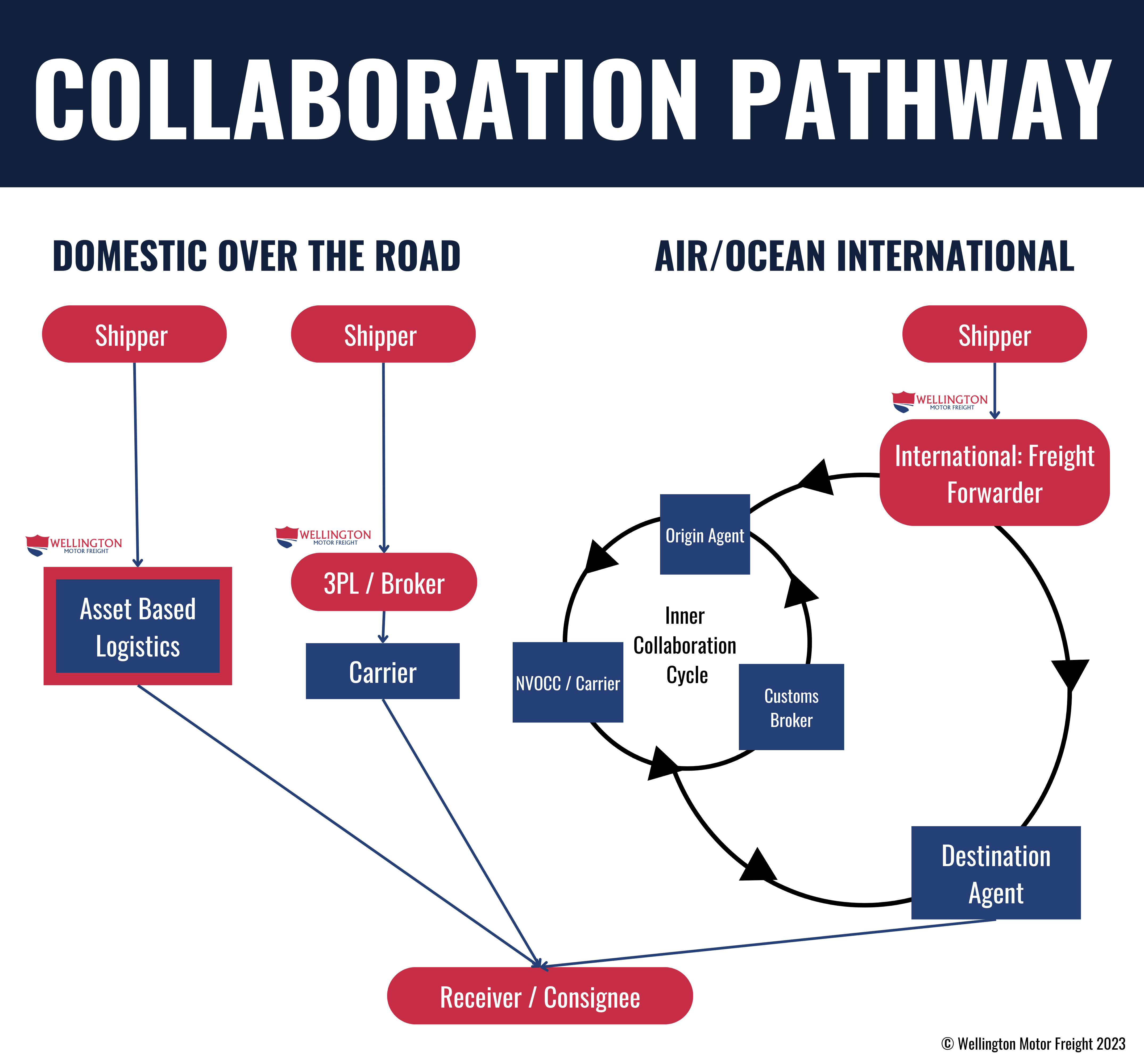When we started the international division at Wellington Group of Companies, we joined the Canadian International Freight Forwarding Association, the Canadian International Freight Forwarders Association (CIFFA), which has allowed us to be part of a great network of partners. A common topic amongst members we spoke to was that ocean / international freight have very different collaboration and partnership practices than domestic over-the-road (OTR) freight.
For OTR freight brokers, carriers, 3PLs, and 4PLs, we often vet, screen, and scrutinize carrier partners before onboarding. This process (like we’ve talked about many times before) is, and should be, rigorous. Brokers are working harder than ever to vet to keep double brokers, dispatch offices, and bad carriers out of their networks. The ideal result is partnerships that are set up and should only waterfall down one step.
In a typical scenario, a logistics broker has freight to move, they partner with a carrier, and the freight is moved to the receiver. Ideally this is a one-connection process that flows down the chain. Any additional carriers or people who are brought into the chain later are typically nefarious and are often a case of double brokering, though there are exceptions.
International is not the same. Partners and agents across the world truly collaborate to move a customer’s freight. It is not a simple one-step waterfall from broker to carrier like it is for OTR freight.
Have a look at the graphic below. You will see a simplified pathway for Domestic OTR, as well as one for international freight forwarding. We have marked Wellington Motor Freight on the chart alongside its roles as a sample.
Using the analogy of an onion and its many layers (I’m thinking of Shrek here, and happy to finally work a Shrek comment into my writing), you realize that what we in North America using OTR might label this as ‘double brokering’ because of all of the external partners that can be brought in under a freight forwarder. Unlike double brokering, this isn’t a criminal activity, it is common practice for a Freight Forwarder or Non-Vessel Operating Common Carrier (NVOCC) agents to create partnerships that benefit the customer.
I was on a Canadian International Freight Forwarders Association (CIFFA) broker call with Joel MacKay, CCLP from Mac Trans when a comment “When we work as inland brokers, we vet to get direct carriers, this is the opposite of ocean” was made. It made me think about the partnerships we have already developed in a short period.
In International freight you need an agent in each country to manage the inland and port portions of a move, then an NVOCC to manage the sailing portion. If you’re landing freight in a country where you do not have an office, you once again need an agent.
These are partnerships, but for the majority of our readers and my connections who are used to domestic OTR, I understand if this appears very similar to double brokering. There is a substantial difference in this case with regulations and licensing, and this process is the norm. Shippers and brokers are not hit with unexpected bills, freight is not held hostage. Since the process is much more complex, it calls for much more collaboration to navigate between nations.
If you are looking to better understand International Freight and learn more about the collaborative pathway that freight forwarding involves, joining CIFFA and DP World (one of the largest port providers globally) is highly recommended. In the coming months, members of our team in the Wellington International division will also achieve their FIATA International Federation of Freight Forwarders Associations (FIATA) certification. We are excited to see the results this network can also bring us.
We have had the opportunity to meet great contacts through networking. Christoph in Germany, Sherry in China, ECU Worldwide, Mainfreight, and they are all great partners to work with. MSC, CMA, Yang Ming, and Hapag have all provided our team with education, capacity, and technology. These partners reach out to Wellington to work with inland North American drayage or final mile deliveries.
When I was young my father introduced me to an old saying “The world is your oyster.” With organizations like CIFFA and FIATA, I understand the saying fully now.
Thank you to all the great partners supporting Wellington International and our customers. Without you, the waters would still be vast.
See you next week!
Bill Robinson
If you’re looking for basics on trucking, check out our Trucking 101 lessons using the link below!

